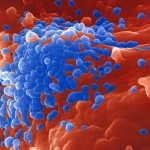Lien vers Pubmed [PMID] – 19843348
Retrovirology 2009;6:96
Retroviruses, hepadnaviruses, and some other retroelements are vulnerable to editing by single stranded DNA cytidine deaminases. Of the eleven human genes encoding such enzymes, eight have demonstrable enzymatic activity. Six of seven human APOBEC3 are able to hyperedit HBV DNA, frequently on both strands. Although human APOBEC1 (hA1) is not generally expressed in normal liver, hA1 can edit single stranded DNA in a variety of experimental assays. The possibility of ectopic expression of hA1 in vivo cannot be ruled out and interestingly, transgenic mice with A1 expressed under a liver specific promoter develop hepatocellular carcinoma. The impact of hA1 on HBV in tissue culture is varied with reports noting either reduced DNA synthesis or not, with cytidine deamination taking a low profile. We sought to examine the hA1 editing activity on replicating HBV. Using highly sensitive 3DPCR it was possible to show that hA1 edits the HBV minus DNA strand as efficiently as hA3G, considered the reference deaminase for HIV and HBV. The dinucleotide specificity of editing was unique among human cytidine deaminases providing a hallmark of use in a posteriori analyses of in vivo edited genomes. Analysis of sequences derived from the serum of two chronic carriers, indicated that hA1 explained only a small fraction of edited HBV genomes. By contrast, several human APOBEC3 deaminases were active including hA3G.
